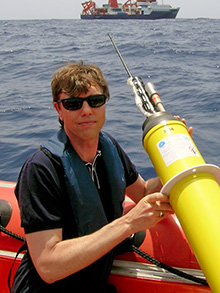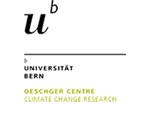Plenary Speaker - Martin Visbeck

Downloads
> View the online video with slides
> Download the powerpoint presentation (pdf)
Biography
Professor Dr. Martin Visbeck
Chair in Physical Oceanography
Helmholtz-Zentrum für Ozeanforschung Kiel (GEOMAR) and Kiel University, Germany
kielmvisbeck@geomar.de
Professor Visbeck’s current research is concerned with integrated marine sciences and in particular with ocean and climate variability and change with an emphasis on the circulation of the Subpolar North Atlantic and Subtropical Oxygen Minimum Zones. For his research he makes use of research vessel based expeditions but is increasingly using modern robotic platforms including profiling floats and gliders, and the development of ocean observatories for long-term observations. He is the co-chair of the World Climate Research Programs Project CLIVAR (Climate Variability and Predictability), which facilitates global climate research in the atmosphere and ocean. He was the chair of the organizing committee of the World Meteorological Organization’s Third World Climate Conference in 2009, which called for the development of the Global Framework for Climate Services (GFCS). He was a member of the ICSU transition team that has developed the new global change research project: FUTURE EARTH Research for Global Sustainability.
Abstract: Selected topics on ocean dynamics in the wider context of climate variability and global sustainability
The mean and time-variable ocean circulation plays an essential role in the regional redistribution of heat, freshwater, carbon, oxygen, and nutrients. On the largest scale, arguably, the global overturning circulations regulate many aspects of the global climate. New observations in the North Atlantic Subpolar Subtropical gyre demonstrate the inherent variability of the Atlantic Meridional Overturning Circulation (AMOC) and the challenge toward fully observing and understanding its dynamics. In the Southern Hemisphere the cross-Antarctic Circumpolar Current flows are thought to play a substantial role in the ocean’s uptake of heat and carbon. Recent observations and model studies suggest that local eddy dynamics need to be taken into account to estimate meridional fluxes. Finally wind driven circulation in the subtropical regions plays a fundamental role in observed changes in subpolar freshwater budgets and regional subtropical sea level trends.
All these cases demonstrate that the rich spectrum of ocean dynamics needs to be considered when estimating changes in regional ocean heat uptake, CO2 budgets, and possibly even more for estimates of future ocean acidification, freshwater budgets and associated changes in subpolar stratification. The complexity of the challenge demands large-scale coordination of ocean observations, research activities, and efforts to inform the public on sustainability issues in the marine realm.















